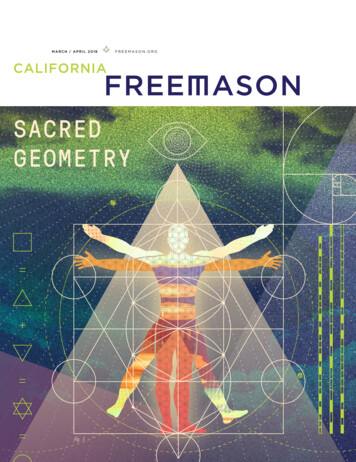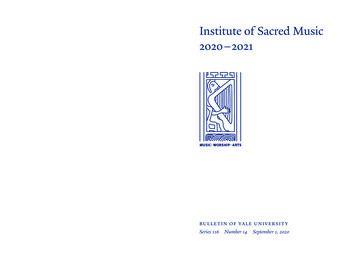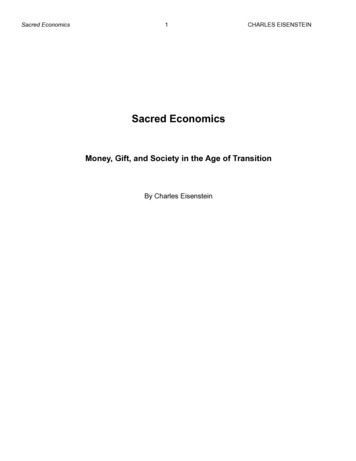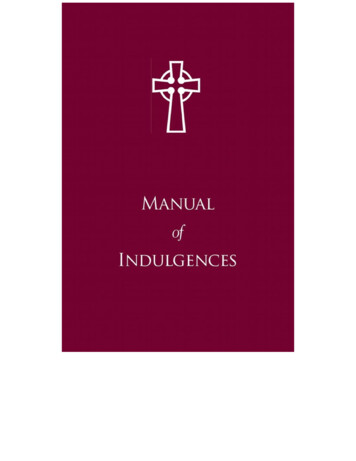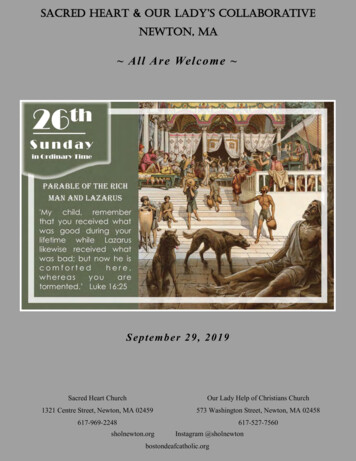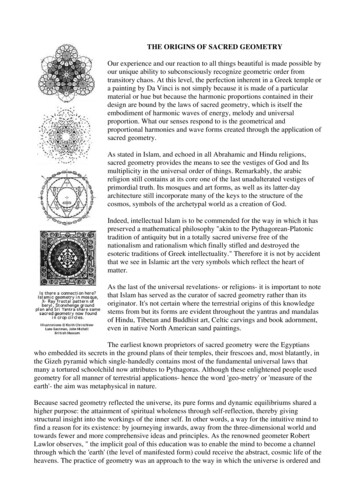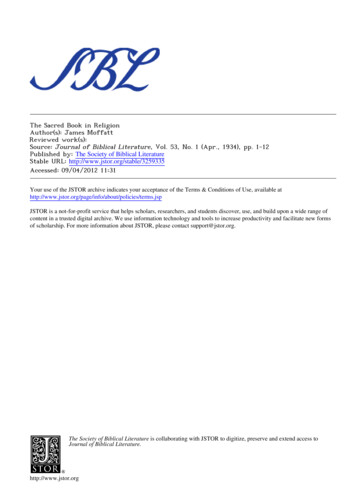
Transcription
The Sacred Book in ReligionAuthor(s): James MoffattReviewed work(s):Source: Journal of Biblical Literature, Vol. 53, No. 1 (Apr., 1934), pp. 1-12Published by: The Society of Biblical LiteratureStable URL: http://www.jstor.org/stable/3259335 .Accessed: 09/04/2012 11:31Your use of the JSTOR archive indicates your acceptance of the Terms & Conditions of Use, available at ms.jspJSTOR is a not-for-profit service that helps scholars, researchers, and students discover, use, and build upon a wide range ofcontent in a trusted digital archive. We use information technology and tools to increase productivity and facilitate new formsof scholarship. For more information about JSTOR, please contact support@jstor.org.The Society of Biblical Literature is collaborating with JSTOR to digitize, preserve and extend access toJournal of Biblical Literature.http://www.jstor.org
THE SACRED BOOK IN RELIGION!JAMES MOFFATTUNION THEOLOGICALSEMINARYTHEcommonbasisof our workin this Societyis an interestin the Sacredbookscalled'TheBible'. Fromdifferentanglesandalongvariouslinesof researchwe studythe text andcontextof great literaturewhich Judaismand Christianityregardasauthoritativeclassicsof their faith. Morethan that; since theof religionin general,andas isolaSacredBookis a phenomenontion is a fruitfulsourceof wrongjudgmentin the historicalinvestigationof ideasandinstitutions,we declineto detachourSacredBookfromsimilarbooksof its classin otherfaithsof the world.Now, in surveyingthe historyof religion,I seemto detect fournegativetruthsabout the SacredBook. (i) Not every religionpossessesa sacredbook. (ii) The sacredbookdoesnot lie besidethe cradleof the faith in question. (iii) No religionlives by itssacredbookalone. And (iv) no sacredbookcan be judgedapartfromthe specificethos of the faith out of whichit roseand forwhichit exists. Each of these four pointswouldaffordelbowroomandmoreforan address.All I can hopeto do is to enquirebrieflyhow far they are applicableto our own sacredbook,The Bible.At the outset I had better say that I quite understandtheobjectiontabledby someJewishscholarsto the use of the term'OldTestament'in criticaldiscussionswithina societylike From' PresidentialAddressgiven beforethe Societyof BiblicalLiteratureandExegesis,December28, 1933.
2JOURNAL OF BIBLICAL LITERATUREtheir point of view, it does imply a religious affirmation or synthesis to which they cannot agree. As a matter of fact, it iscurious that in France and even in England, down to the beginningof last century (as readers of Charles Lamb will recollect), theterms 'Bible' and 'Testament' were occasionally employed forwhat we call 'the Old Testament' and 'the New Testament'.When I use 'Bible' and 'biblical' in their accepted sense, therefore,I simply follow for the sake of convenience the traditional usageof our Society, even although 'Bible' means one thing for a Jewand another for a Christian. The point is, that our commonattitude to a Sacred Book involves belief in a collection of ancientliterature which was originally intended to represent the sourcesand the standards of the religion in question; furthermore, thatthis attitude prompts the desire to apply to its study the ordinaryprocesses of literary and historical criticism.(i) A Sacred Book or Bible, thus defined, is one thing; religiouswritings, however popular or primitive, constitute another. Anumber of ancient religions had no such sacred books at all.Thus, neither the Eddas nor the Pyramid Texts of Egypt werebibles of the people. Neither Greece nor Rome apparently feltany need of a Sacred Book; in the case of Roman religion thenearest analogy, and it is far-off rather than near, would be theSibylline Oracles, and although the Greek Oracles approximateto the notion of a Sacred Book, as being inspired directions forhuman life at the cross-roads, still they are a distant parallel.It may be true, as some scholars like Andrew Lang2 have maintained, that Hesiod's Theogony "was taught to boys in Greece,much as the Church catechism and Bible are taught in England";certainly the reaction of philosophers like Xenophanes andHeracleitus as early as the sixth century B.C. against thedemoralizing effect of veneration for Homer, does indicate thata sort of religious authority attached to the Homeric epics insome circles. But it is only a pretty literary phrase, to speak ofHesiod or Homer as a Bible for the ancient Greeks. No doubt,in some religious movements, such as Orphism and the cult ofIsis, hymns and prayers arose. One or two of the mystery-cults2Myth, Ritual, and Religion (chapter x).
MOFFATT: THE SACRED BOOK IN RELIGION3show occasional traces of divine words or scriptures in theirreligious tradition. But this falls short of the full functionsassigned to a real Sacred Book.Nearly sixty years ago, when Max Muiller projected "TheSacred Books of the East" series, he found that he had to drawsuch a distinction. Apart from Judaism and Christianity, hereckoned only six great and original religions which professedto be based in any way upon sacred books; Islam, of course,with Brahminism, Buddhism, Zoroastrianism, Confucianism, andTaoism. But in two directions this list must be revised. It isonly with serious reservations that one can speak of a sacredbook in connexion with Brahminism, for example, and the vastbaskets of the Buddhist canon are not on the same level as theKoran. Nor do the two Chinese movements rest upon a sacredbook, in the strict sense of the term. The Taoist scripture, thoughcomposed or inspired by the philosophical Laotze, is as little adefinitely religious authority as the classics of Confucianism,which do not profess to be sacred books belonging to the categoryof the Vedas, for example, although their practical effect uponthe civilisation of China did come to resemble that producedby the Sacred Book in Judaism or in Christianity. Even theVedas make no appeal to the vast mass of Hindoos, who paylittle more than a distant homage to their ancestral prestige forthe nation, and do not regard them technically as a Bible. Onthe other hand, it is true that since Max Mtiller compiled hislist, it requires to be enlarged, for Manicheeism and the Sikhreligion now fall to be included in this class of scriptural faiths.In Sikhism, that remarkable off-shoot of Hindooism in thePunjaub, which was started by an older contemporary of MartinLuther, there is indeed a liturgical miscellany or Sacred Book,which is venerated and even idolized. Dr. J. N. Farquhar reportsthat at Conjeveram he once saw an altar where fire-sacrifice wasoffered to this Granth Sahib or Lord Book. It is the Lord orGuide of devout Sikhs. Even to intone it, without understandingit, is a means of grace. One copy lies in the lovely Golden templeat Amritsar, covered with costly brocade, and before it thefaithful lay flowers, sweets, and food; attendant priests fan it,as an act of homage. This is true Bibliolatry. Yet the Granth
4JOURNAL OF BIBLICAL LITERATURESahib does not regulate the praxis of the Sikhs. It is a hugecollection of rhapsodiesand regulations,written in a variety oflanguages, often utterly obscure-a compilation drawn up between the end of the sixteenth and the beginning of the seventeenth century, containing alleged messages of the true Gurusor prophets of the faith. Yet the various sects do not live bytheir adored book, as Jews, Moslems and Christians do, orprofess to do, by theirs. The Sacred Book here is part of theres sacrae. A Sikh gains merit by paying a priest to intone it forhim, and this counts as a mass for the dead. Certainly theSacred Book holds the Sikhs together as a nation, but its functions are not those of a bible used by the ordinary worshipperor employed as a guide to life.The rich, recent finds of Manichean scriptures in Egypt andthe far East enable us to see more clearly than ever that Maniplanned to compile a sacred book of his own. This third centuryprophetlaid specialstressuponthe writtenword. Like Mahommedlater, he was convinced that the Jewish and the Christianscriptures were imperfect transcripts of divine revelation. Indeedthe parallel with Islam is quite close at this point, for Mani'ssacred scriptures like the Koran meant an implicit critique ofthe very Bible to which they were largely indebted. Mani desiredto present his internationalfaith through scriptures, instead ofallowing it to trickle along any channels of oral tradition. Heappears to have had a canon of his own, a real Bible, for thepurpose of conserving and disseminating his supreme religious'Wisdom',a Bible with psalms, gospels, and apocalypses. Betterhave this 'Wisdom'written down in authentic form, he thought,than suffer it to be spoiled, as the real message of Jesus hadbeen by never having been committedto writing by Jesus himself,but having been left as a tradition to the inferior minds of hisdisciples.However, Manicheeism is not a living faith today as evenSikhism may be said to be. Upon the whole, the Sacred Bookin its most developed form belongs to only three great religions,Judaism,Christianity,and Islam, all deriveddirectlyor indirectlyfrom Semitism. Each of these peoples may be fairly described,
MOFFATT: THE SACRED BOOK IN RELIGION5as no other can be, in the phrase 'a people of the Book'. Thestudy of ComparativeReligion convergeson this conclusion.(ii) That the Sacred Book does not lie close to the cradle ofits religion, is obviously true when we take 'sacred book' in thewider sense of any early scripture. When the Oriental belief indivine inspirationwas strong, it often preferredoral transmissionto any written form. In primitive religion,which is pre-literary,a sacred writing, usually in the shape of an oracle, plays a minorpart, and even in the later stages of religion it is oral traditionor transmission which is vital, rather than any literature. Aglanceat religionssuch as Hindooism,Brahminism,or Buddhism,is enough to show that the origin of the Sacred Book requiresacertain advance in civilisation before its functions can be operative. To take only one instance:when the emancipatedadherentsof Jainism, in the sixth century B.C., rejected the Vedas for apurer faith, they had to form sacred oracles of their own, butthese were handed down orally; indeed the canon of their scriptures was not finally edited until about the middle of the fifthcentury A.D.Yet in the case of the three religionsof a Book we cannot saywithout qualificationthat the Sacredscripturedoes not lie besidethe cradle of the faith. Islam in particulardisproves the thesis,for the Koranwas compiledwithin a few years after the Prophet'sdeath. Even Judaism, starting from Ezra's reforms, has theTorahat its centre--no doubt, not the full collectionbut essentiallythe Torah as the Sacred nucleus of the nation. The Old Testament does reveal the long gap between Abrahamor even Mosesand the rise of what was the germ of the Torah. From this pointof view it corroboratesthe principlethat the SacredBook belongsto a fairly mature period in the developmentof a living religion.Still, the impetus which carriedthe people from the Mosaic faithof Hebraism into Judaism was at once accompaniedby a stressupon the written Word, a stress inherited no doubt from theearlier stages but developing instinctively into a larger andkeenerdevotion to the Sacred Book.The Christianreligion,inheritingscripturefrom Judaism, alsodeveloped almost at once its own literature, the smallest of allSacred Books. But, while the Old Testament literature took
6JOURNAL OF BIBLICAL LITERATUREmore than five centuries to grow, the documents afterwardscollected into the canon of the New Testament flowered withinhalf a century. Between the first of the apostle Paul's epistlesand the end of the first century, the bulk of our New Testamentcame into being. It is not the only instance of great literaturesurging up within half a century. There are partial parallelsin the Greek prose and poetry that rose between 450 and 400B.C. from dramatists and historians, also in the supreme poetryof the four Latins, Catullus, Virgil, Lucretius, and Horace, allwithin half a century, and contemporaries of men like Livy,Cicero, and Sallust; and then we have the sudden emergence ofthe Elizabethan literature between 1590 and 1640, when a newbreath of unity and confidence inspired the people of England,or in the last half of the seventeenth century under Louis Quatorze,when the brilliant literature reflects the energy displayed byFrance in nearly every department of politics. At such epochsthere is commonly an intensity of national life, exciting theimagination; out of this ferment the literature rises. In the caseof Christianity, with Christ as its foundation rather than as itsfounder, there was no nation, indeed, but there was an extraordinary fellowship of faith and common purpose which led tothe classics of the new religion blossoming so close upon theinitial impulse. The phenomenon is all the more striking if theliterary variety of the New Testament is compared with themonotony of the Koran, where the forms of composition aresubstantially identical, and there is a single authorship.(iii) By the third century, when the authorities of the Empirerealised that the Christian movement was really formidable,they were acute enough to recognize that the possession of aSacred Book was characteristic of the new faith and cult. Theliterary attack and a persecution like that of Decius single outScripture as vital to Christianity. Yet the historian knows thatthe Christians were not living by their Sacred Book alone duringthese formative years. The New Testament was held to embodythe authentic apostolic witness indeed, but the apostolic succession in the ministry, and the apostolic rule of faith, includingthe sacraments, were equally organic to the Church. In thesepre-canonical years the New Testament was regarded as the
MOFFATT: THE SACRED BOOK IN RELIGION7inspired record of apostolic testimony to the deposit of thetruth, but both were conveyed and conserved, developed andapplied, by the sacred tradition of the Church with its cultus,'tradition' being practically equivalent to the transmission of aliving Spirit which took forms other than those that were merelybiblical. Men lived indeed "by every word that proceedeth outof the mouth of God," but not every such word was writtendown.When I say that no religion lives by its Sacred Book alone,I am not referring to the religious literature produced by thereligion, generally in the wake of its Sacred Book-to devotionalclassics like the Bhagavad Gita in Hindooism, the Lotos Scriptureor The Awakening of Faith which in Japan especially havemoved so many millions of Buddhists, or The Imitation of Christand The Pilgrim's Progress in western Christendom. It is truethat such secondary writings have sometimes usurped a prominence which threatened the primacy of the Sacred Book itself.Thus, one of the causes that led to the comparative relegationof the Bible to an inferior rank within the early ages of westernChristendom was not only the habit of stressing the creed (forwhich the Bible was now important as a source of proof-texts)or of turning to take the Bible as a compendium of doctrine,but the multiplication of saints' lives, biographies of quiteinferior character as literature and as religion, but immenselypopular. No, what I mean by this statement is that any vitalreligion which inherits a Sacred Book from a definite age, evenfrom the age of its origin, is obliged to develop an interpretationof it, oral and written, for the purposes and needs of furthergrowth. The people may be the people of a Book, but they areheld together by customs and usages as well as by rites, slowlyelaborated, and these commonly are related to a Sacred Bookwhich originally made little or no provision for the majority ofthem.Hence the rise of what we call 'tradition', which is involvedby lapse of time and change of environment for any religiouscult that is to survive in the struggle for existence, or rather tosurvive and thrive, instead of remaining a mere survival, holdingon to forms of expression that are now anachronistic. The mate-
8JOURNAL OF BIBLICAL LITERATURErials of tradition, as we meet it in the field of religion, consistof statements about historical data, the interpretation of suchdata, and also rules for action and life within the community towhich the data are communicated,sanctions for conduct, standards for worship, and definite principles of right belief. Nodoubt the Sacred Book itself reflects this, and further embodiesand even applies it. Yet, for all its authority, the Book alsorequires interpretation, as time goes on. It supplies a normrather than a form for sacred rites and usages, as a rule. Itdoes dischargea regulativefunctionin the communityor Church,but in turn it has to be supplemented to a certain extent byother 'traditions',which are not derived simply from its contentsor directly from its verbal statements, and which call out thework of trained priests or scribes. This exigency, which meetsall the historical faiths, is the spring of the violent oscillationswhich have characterizedthe history of Islam, Christianity,andJudaism. At present, within the field of early Christianitythereare signs that the problem of 'tradition' is being re-stated andre-considered,just as a truer appreciationof the New Testamentliterature within the complex of the movement is being gained.In the rebound from a mediaeval attitude which tended toobliterate the paramount significance of the Bible in stressingdoctrinalcorrectness,there was apt to be a one-sidedexaggerationof the Bible's function in the first few centuries, which erredby isolating it unduly from the spontaneousgrowthof 'tradition'.Up to a certain point, the phenomena of tradition are practically the same in all three faiths. But differences emerge,owing to the specific elements in each. And this brings us tothe (iv) fourth point which I suggested, namely that no SacredBook can be duly judged apart from the specific ethos of theparticularreligionin question. It is the very problemof traditionin relation to the Sacred Book that sets this point sharply beforethe mind of the investigator, since the differentiaof a faith herebecome crucial.Thus, for the devout Moslem the sunna or tradition not onlyexplainsany difficultiesin the text of the Koranbut supplementsthe Koran itself. Which it can do, because sunna is regardedasthe expressionof what Mahommedactually taught, though not
MOFFATT: THE SACRED BOOK IN RELIGION9perhaps in writing. The Word of Allah and the sunna of HisProphet-these together guide and govern orthodox Islam, justas the oral Law or traditions of Judaism are an extension andauthoritative complement of the Torah. In both cases, thecommunity of the nation is held together by the contents ofsuch traditions, embodied in rites and practices especially, inregulationsabout food and dress and worship, all of them binding upon the believer. To somedegreethis is also prevalentwithinChristianity,wherefromthe firstapostolictraditionwasdominant,and the religion lived by developing fresh forms of thought andlife and worshipas it continued to meet changesof environment.All of these developments did appeal more or less directly tothe original authority implicit in the Sacred Book. They weresupposed to be fuller expressionsof what had been meant bythe Lord. Yet the Christian religion had an ethos of its ownwhich made the relationship between Church and Bible moreintricate and urgent than in the case even of Judaism or Islam,since Christianity was not a national religion. In so far astradition involved the interpretationof the Sacred Book itself,the methods of Christian exegesis were not very different fromthose of Judaism. But whilst it carried on the idea of a livingWord of God, it developedthis not only as a term for continuousrevelation but for Jesus Christ. Historical Christianity impliedmore than the possession of a Sacred Book as the palladium,or as a code, or as a record of its origins; it read its scripturesin the light of belief in a living Spirit of God still workingin andthrough history, and the revelation enshrined within the Bookwas supposedsomehowto reverberatestill inside the loyal livingChurch. Thus the formation of the Christian Bible and thefunctions attributed to it did not precisely correspondto thoseof the Torah or of the Koran. Both in the Greek and in theRoman branches of catholicism, the vitality and freedom ofthe Christian spirit was recognized,at any rate in principle, asthe Church came to be conceived as the Body of the Lord;honour paid to the Bible as a religious authority of distinctivepower was not permitted to turn the Church into a biblicalsociety. It is a minor point, but one worth noting, that the veryallegorical interpretation of the Bible helped in this direction.
10JOURNAL OF BIBLICAL LITERATUREFantastic and unreal as it may often appear to our historicallytrained minds, it not simply saved the Old Testament for Christianity, when some enthusiasts would have scrapped it, but,by its appeal to free imagination, did prevent the faith frombecoming too biblical, and witnessed, often in an unsound way,to the sound truth that Christianity is a continuous processwithin the historical order, neither a meticulous reproductionof the biblical past nor a bible-less liberty for forward-lookingsouls to make private excursions in search of a faith which hadbeen once delivered to the saints. To hold this sound truth hasmeant a repeated tension. Yet the tension is inevitable, as thespirit of the faith refuses to isolate the Bible from the Church.The distinctiveness of the various religions emerges, I repeat,in connexion with the crucial problem of tradition in relationto the Sacred Book. But this opens up into a further point, onwhich I desire to say a word before closing. Even in form, somesacred books are intended to convey the idea that they areliterally the Word of God. This holds true of the Avesta as wellas of the Koran; to read these scriptures of the Zoroastrian faithor of Islam, or to listen to them, is to feel instinctively that theyclaim to be direct utterances of the Deity to mankind, since,even when, as at certain points, the prophet puts questions tohis God, the answer comes as the more important feature in thedialogue. There is a partial approach to this in the Laws ofManu, a code based upon the Vedas, which is authoritative forHindooism; in this manual of religious jurisprudence, Manuspeaks for Brahma as his mouthpiece. But it is the Koranwhich, above almost all sacred books, claims to be the inspiredWord of the Deity. No doubt, the Rig-Veda had come to beregarded by Hindoos as the first work of heaven, and claims fora pre-existent entity were also made by rabbis for the Torah,which were not less high. Zoroastrians too believed that theirclassics had been not simply revealed to the prophet but actuallycreated by God. Still the Koran soars higher. Even in its composition, according to orthodox Islam, it is a miracle. Literally,far more than the Bible, it is God's Word, for not only are itswords in Arabic, the language of Allah Himself, but its contentsare taken to have been for the most part communicated to the
MOFFATT: THE SACRED BOOK IN RELIGION11Prophet in a trance, often by mediation of the angel Gabriel.Thus, in the strict and ancient sense of the term, it is a book oforacles. Indeed the written Koran, which only came into existence after the Prophet's death, when his scribe or secretaryZaid was induced to collect the contents of it, the written Koranis held to be merely a transcript of God's own Word which issafeguarded in heaven. As such it is the final revelation, superseding all previous words of the Lord. Islam thus started with asingular advantage in the matter of a Sacred Book. It had nocontroversy over any Canon, such as vexed Judaism and Christianity. It managed practically to eliminate textual criticismas a diversion for the devout, being properly conscious thatvariant readings are incongruous with oracles! The Koran istherefore able to start off bravely by declaring, "There is nodoubt in this book." There is nothing like the book of Job,nothing like the arguments of the apostle Paul. Of course, theremay be doubts about it, raised by its very claims. Whether theadvantage of securing finality at the expense of history andargument is not gained at too heavy a price, is a fair question.But the point is that the Koran secured its hold upon popularIslam by avoiding any problem of a relation between historyand religion, even although Islam has had eventually to developtraditions, like Judaism and Christianity, in order to conserveits position within history.In Judaism and Christianity alike there was and is a definiteappeal to history such as Islam does not require. Consequentlythe very form and content of their Sacred Books differ fromthe Koran. History enters the pages of the Bible, and withhistory the inevitable element3 of what is called 'the accidental'or 'the particular' or 'the relative'. Argument and reasoningalso have a place, since the revelation is more than a transmission of abstract orders dictated from heaven. The strength ofboth faiths lay as it lies in this historical conception of religion.But it is obvious that this very strength is accompanied by3On the allied problemof the relationof the past to the present,in thisconnexion, see A. Bill's recent remarks in Revue d'Histoire et de Philosophiereligieuses(1933, pp. 331f.).
12JOURNAL OF BIBLICAL LITERATUREcertain handicaps, from the point of view of a Sacred Bookwhich is supposedto rule a communitythroughoutages of change.And within Christianity,where the revelationof God is believedto be a personal revelation through the living Lord, the SacredBook which attests this cannot in the nature of the case be abook exactly like the Old Testament in the synagogue or theKoran in the mosque, nor can it be interpretedprecisely as anyof these.It would be too large a task even to outline the problemsthatswarm round this differentiationof the Sacred Books. I closeby calling attention to it, and by suggesting that perhaps thenew philosophies of literature which are characteristic of ourage may pave the way for a re-considerationof the question ofinspiration,especially now that the criticism of the New Testament is passing into larger phases than those contemplated bythe literary or historical methods of the last half century. Thewhole question of the relationship between literature and life,or of the connexion between literary forms and literary forces,makes for a richer appreciationof some ultimate issues relatingto the Sacred Book in the sphereof our religionas of any other.
Book from similar books of its class in other faiths of the world. Now, in surveying the history of religion, I seem to detect four negative truths about the Sacred Book. (i) Not every religion possesses a sacred book. (ii) The sacred book does not lie beside the cradle of the faith in question. (iii) No religion lives by its sacred book alone.


![The Book of the Damned, by Charles Fort, [1919], at sacred .](/img/24/book-of-the-damned.jpg)
